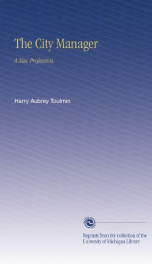social historians

Purchase of this book includes free trial access to www.million-books.com where you can read more than a million books for free. This is an OCR edition with typos. Excerpt from book: GEORGE WASHINGTON CABLE " Fancies and passions miscreate By man in things dispassionate." Swinburne. WHEN Sainte-Beuve announced his method of interpretative criticism embodying an investigation of the author's life and productive influences as well as the book itself, he gave the first decided impetus to a really rational criticism. Not only was this challenge to the accepted methods a flaunted insult to classicism, and to the rigid conformist to ancient models, but, also, it was a world extensive declaration for sane critical judgment, for an equitable interpretation of the literary artist. The theory demanded fair dealing between the judge and the judged. George W. Cable is a case in point. Exclusive attention to his concrete works would be as unjust for a comprehensive estimate of his position inSouthern Literature, as would the mere study of his surroundings and personality. Both are integral parts of the same unit. (i). The several generations of his ancestors with their respective opinions, handed down to Mr. Cable a curious anomaly of ideas destined to have a radical influence upon his career. The blood of the Dutch, English-Puritan, and German stocks are all mingled in his veins. His grandfather was a German, George Cable, born in Virginia of the old family of Cables; he later removed to Pennsylvania where, together with his wife, Margaret Stott Cable, who was of Dutch descent, they agreed to free their negroes, both having decided prejudice against holding slaves. Subsequently, the family moved to Indiana, where the father of the novelist married a woman of extraordinary character, Rebecca Boardman; she was of English- Puritan ancestry from the New England States. As a result of the financial crisis of 1837, the father of the novelist failed in business ...
Info about the book
Author:
Series:
Unknown
ISBN:
1934843415
Rating:
4/5 (4)Your rating:
0/5
Languge:
English
Users who have this book
Users who want this book
What readers are saying
What do you think? Write your own comment on this book!
write a commentGenre
if you like social historians try:
Other books by this author
Do you want to read a book that interests you? It’s EASY!
Create an account and send a request for reading to other users on the Webpage of the book!



